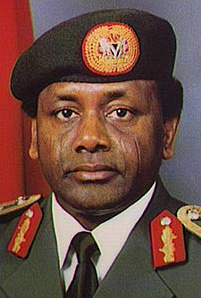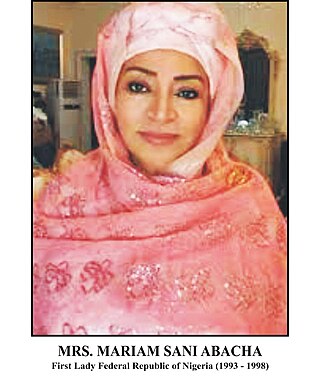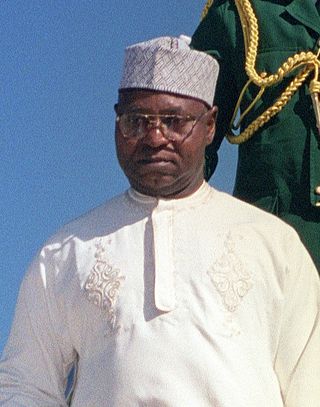Other uses
- Abacha (food), type of food
Abacha is a town in Nigeria. Abacha may also refer to:

Sani Abacha ; was a Nigerian military dictator and statesman who ruled Nigeria with an iron-fist as the military head of state from 1993 following a palace coup d'état until his sudden death in 1998.

The president of Nigeria, officially the president of the Federal Republic of Nigeria is the head of state and head of government of the Federal Republic of Nigeria. The president directs the executive branch of the federal government and is the commander-in-chief of the Nigerian Armed Forces.

The 2000 African Cup of Nations was the 22nd edition of the Africa Cup of Nations, the association football championship of Africa (CAF). It was co-hosted by Ghana and Nigeria, who jointly replaced Zimbabwe as host. Just like in 1998, the field of sixteen teams was split into four groups of four.
The Sani Abacha Stadium is a multi-purpose stadium in Kano, Kano State, Nigeria. It is mostly used for football matches and athletics. The stadium is the home of Nigeria Professional Football League (NPFL) side Kano Pillars F.C. The stadium has a capacity of 16,000 and is named after General Sani Abacha, the deceased former military head of state.

Maryam Abacha ; born 4 March 1949) is the widow of Sani Abacha, Nigeria's military ruler from 1993 to 1998.

The Third Republic was the planned republican government of Nigeria in 1992 which was to be governed by the Third Republican constitution. In the Third Republic, there were democratically elected state governors and state assemblies and a democratically elected federal legislature. The republic was however not fully democratic as there was no democratically elected civilian president. The then military president Ibrahim Babangida's supposed transition eventually turned out to be a ploy to keep executive powers and grant the National Assembly limited legislative powers. Hence all laws passed by the Senate and House of Representatives will have to pass the National Defence and Security Council of Nigeria and finally approved by the President. So while Babangida changed the usual style adopted by preceding military leaders from Head of State to president, he will continue to postpone presidential elections and eventually annul the ultimate one held on 12 June 1993. The Third Republic can thus be described as half military and half civilian.
Donaldson Oladipo Oyeyinka Diya, ; 3 April 1944 – 26 March 2023) was a Nigerian general and lawyer who served as Chief of General Staff under military head of state General Sani Abacha from 1994 until his arrest for treason in 1997. He also served as Chief of Defence Staff and as military governor of Ogun State from January 1984 to August 1985.

Abdulsalami Abubakar is a retired Nigerian army general who served as the military head of state of Nigeria from 1998 to 1999. He was also Chief of Defence Staff from 1997 to 1998. He succeeded General Sani Abacha upon the latter's death.
Jeremiah Timbut Useni is a retired Nigerian army lieutenant general, who served as minister responsible for the administration of the Federal Capital Territory, Abuja under the Sani Abacha military junta. He served Nigeria in various capacities such as Minister for Transport and Quarter-Master General of the Nigeria Army. Useni also served as Deputy Chairman of one of the significant parties in Nigeria, the All Nigeria Peoples Party. He was elected Senator for the Plateau South constituency of Plateau State, Nigeria in the March 2015 national elections. Useni was running on the People's Democratic Party (PDP) platform.
The Grassroots Democratic Movement (GDM) was a Nigerian political party that was one of the five state-sanctioned political parties allowed by the government of General Sani Abacha to participate in state assembly elections held in December 1997, and in parliamentary elections held in April 1998. The other authorized parties were the United Nigeria Congress Party, Congress for National Consensus (CNC), Democratic Party of Nigeria (DPN) and the National Centre Party of Nigeria (NCPN).
Mustapha Ismail was administrator of Kwara State from December 1993 to September 1994, and was later military administrator of Adamawa State between September 1994 and August 1996 during the military regime of General Sani Abacha.
Colonel Ahmed Usman was a Nigerian military administrator of Ondo State and later Oyo State during the military regime of General Sani Abacha.
Lawan Gwadabe is a Nigerian military officer. He served as Military Administrator of Niger State in Nigeria from December 1987 to January 1992 during the military regime of General Ibrahim Babangida. He was accused of planning a coup against General Sani Abacha in 1995, for which he was jailed, tortured and convicted of treason. After Abacha's death he was granted a state pardon.
Mohammed Chris Alli was a Nigerian Army major general who served as Chief of Army Staff from 1993 to 1994 under General Sani Abacha's regime and was military governor of Plateau State Nigeria from August 1985 to 1986 during the military regime of General Ibrahim Babangida. Many years later, he was appointed interim administrator of the state during a 2004 crisis in the state following ethno-religious killings in Shendam, Yelwa Local Government.
Alhaji Dahiru Mohammed Deba is a Nigerian politician who was elected Governor of Bauchi State, Nigeria between January 1992 and November 1993 during the Nigerian Third Republic, leaving office after the military coup that brought General Sani Abacha to power.
Mohammed Inua Bawa was appointed the Administrator of Ekiti State, Nigeria during the military regime of General Sani Abacha. He was then appointed Administrator of Gombe State from August 1998 to May 1999, handing over to the elected civilian governor at the start of the Nigerian Fourth Republic.
Colonel (retired) Jibril Bala Yakubu was the first Administrator of Zamfara State after it was created from part of Sokoto State in October 1996, holding office until the return to democracy in May 1999 during the military regimes of Generals Sani Abacha and Abdulsalami Abubakar. As Zamfara administrator, Yakubu created five Emirates in the state and eleven new District Councils. After handing over to the civilian governor Ahmed Sani Yerima in May 1999, as a former military administrator he was required to retire from the army.

Abubakar Atiku Bagudu is a Nigerian politician who is the current Nigerian minister of budget and economic planning. He served as governor of Kebbi State from 2015 to 2023. He also served as the senator representing the Kebbi Central senatorial district from 2009 to 2015.

Hamza Al-Mustapha is a retired Nigerian Army major, intelligence officer and politician who served as Chief Security Officer to Head of State General Sani Abacha from 1993 until his death on 8 June 1998 an advocate of good governance.

The 1993 Nigerian coup d'état was a bloodless military coup which took place in Nigeria on 17 November 1993 when the Armed Forces, headed by Defence Minister General Sani Abacha, forced Interim President Chief Ernest Shonekan to resign. Shonekan assumed the interim presidency on 26 August 1993, succeeding General Ibrahim Babangida as head of state, in the aftermath of Babangida's annulment of the 12 June 1993 presidential election. In a nationwide broadcast following the coup, Abacha cited the stagnant nature of Shonekan's government, and his inability to manage the democratic process in the country as a cause of his resignation. In September 1994, Abacha issued a decree that placed his government above the jurisdiction of the courts, effectively giving him absolute power. Another decree gave him the right to detain anyone for up to three months.